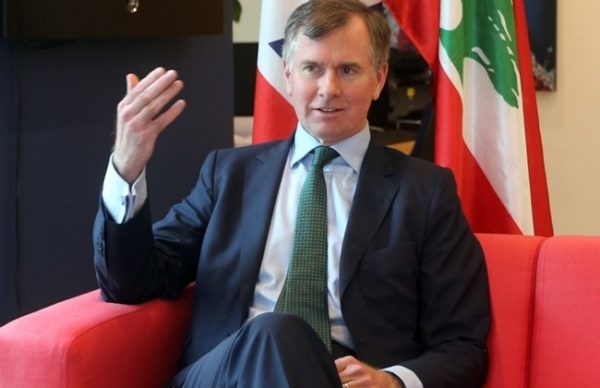Shorter warned that the “tremendous brutality” of the regime was a stumbling block to a political settlement or refugee return.
“The Assad regime … has barrel-bombed its own population, has gassed its own population, starved its own population. I don’t see how any part of Syria where Assad is still in charge can be somewhere these refugees who have fled here [to Lebanon] are going to be able, safely, return to and feel comfortable about returning to,” he said.
The ambassador reiterated the U.K. government’s long-held stance that calls for Assad to step aside. However, when asked how the U.K. would negotiate if Assad doesn’t vacate his post, Shorter said simply: “We don’t accept that scenario.”
“We continue to say that for real stabilization, reconstruction to happen in Syria there needs to be clear transition underway away from the Assad regime,” he stressed.
Commenting on claims by pro-Syrian politicians that the country is now safe enough to begin this process of their return he said this is “misrepresentation of what is actually happening there.”
President Michel Aoun and other pro-Syrian politicians have been calling for the return of the refugees , claiming that 85 % of Syria is now in the hands of the regime , while March 14 politicians have been warning about such a premature move, while Assad is in power .
Aoun is a stanch ally of the Iranian-backed Hezbollah militant group and the Syrian regime
The ambassador cautioned against rushing the return of Syrian refugees, saying this was a process that had to be done correctly. “I think there’s a risk of going down the wrong track with a premature decision [to return Syrian refugees] which everyone will live to regret.”
Lebanon is currently hosting over 1.5 million refugees from Syria.
Shorter also expressed s concerns about Hezbollah’s growing regional influence.
“We’re extremely concerned by Hezbollah’s regional activities, destabilizing activities that have fueled conflict in Syria, Yemen and Iraq. Here in Lebanon, there is a decision for the Lebanese people as a whole as to what kind of country they want to live in,” he said.
Touching on recent U.S. and Israeli rhetoric regarding Hezbollah and its relationship to the state – particularly recent comments that the two were now indistinguishable, making the Lebanese state a legitimate target in future conflicts – the U.K. ambassador called on all parties to step back in order for diplomacy to prevail.
“That kind of rhetoric on both sides is not helpful toward maintaining stability here,” he said.
“I don’t believe that any form of military confrontation or conflict is ultimately the way to guarantee stability over the long term … There is a question of how at some point dialog can be made to happen in a constructive way but that to my view is the central question.”


Leave a Reply
You must be logged in to post a comment.